|
|
|
Sort Order |
|
|
|
Items / Page
|
|
|
|
|
|
|
| Srl | Item |
| 1 |
ID:
129967
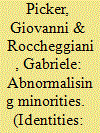

|
|
|
|
|
| Publication |
2014.
|
| Summary/Abstract |
This article expands the research on abnormalisation and the construction of social deviance of minorities. It focuses on the relationships between state practices, policies and expert knowledge addressing the Roma in Italy; it does so by first contextualising recent ethnographic findings on Turin authorities' social inclusion practices addressing Roma within the history of national and regional policies for Roma; it then contextualises those policies within the history of expert knowledge about Roma. Unlike what other studies on abnormalisation suggest, we argue that the abnormalisation of Roma in Italy is not primarily predicated upon the idea that they are at present unfit to follow the norms of the majority; rather, it stays upon a historically rooted representation of Roma oscillating between the poles of potential re-educability and potential dangerousness. In the conclusion we encourage further comparative research on abnormalisation, especially including practices and knowledge addressing other European minorities such as the Jews.
|
|
|
|
|
|
|
|
|
|
|
|
|
|
|
|
| 2 |
ID:
046617
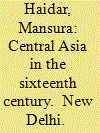

|
|
|
|
|
| Publication |
New Delhi, Manohar Publishers, 2002.
|
| Description |
404p.hbk
|
| Standard Number |
8173044627
|
|
|
|
|
|
|
|
|
|
|
|
Copies: C:1/I:0,R:0,Q:0
Circulation
| Accession# | Call# | Current Location | Status | Policy | Location |
| 045884 | 958.102/HAI 045884 | Main | On Shelf | General | |
|
|
|
|
| 3 |
ID:
127643
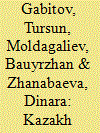

|
|
|
|
|
| Publication |
2013.
|
| Summary/Abstract |
This article focuses on determining the place and role of the Kazakh culture in the Eurasian civilizational area. It examines the choice of sociocultural development models for the Republic of Kazakhstan in globalization and localization conditions. The Kazakh culture is identified in the context of its interaction with the nomadic, Islamic, Russian, Central Asian, and East Asian civilizations. It analyzes the role of cultural factors in building the new post-Soviet Central Asian states.
|
|
|
|
|
|
|
|
|
|
|
|
|
|
|
|
| 4 |
ID:
100029
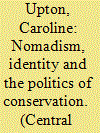

|
|
|
|
|
| Publication |
2010.
|
| Summary/Abstract |
This paper highlights the continuing importance of nomadism as an aspect of identity in contemporary Mongolia, and one which retains strategic, discursive and material resonance at diverse scales. It examines the contested representations and practices of nomadism with particular reference to conservation and to relations with land and nature. At a national level, nomadism remains a powerful, albeit romanticized, symbol of collective identity, often deployed, for example by urban elites with reference to a 'glorious past' (Bruun 2006). At the same time emergent urban identities are increasingly important in informing national self-representations of Mongolia, while contemporary nomadic herders are subject to contrasting discursive portrayals in mainstream conservation debates and policies. Particular concepts of relations with nature, including re-emergent spiritual dimensions, are highlighted as aspects of nomadic identity and practice at local levels, and their contrasts to and accommodation with donor-driven conservation projects explored. Finally, the paper highlights the emergent Global Pastoralists' movement as an important arena wherein Mongolian pastoralists can begin to deploy their own discursive representations of contemporary nomadic identities.
|
|
|
|
|
|
|
|
|
|
|
|
|
|
|
|
| 5 |
ID:
113871
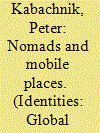

|
|
|
|
|
| Publication |
2012.
|
| Summary/Abstract |
Though there is a danger that 'place' may become subsumed or ignored in research as attention now shifts to questions of 'mobility,' discussion of place has burgeoned throughout academia. Many texts declare that place is important, or proclaim the power of place. While place has been shown to be a fundamental part of human existence, what does this then mean for those who are characterized as not being interested in places? Examining nomadic Gypsies and Travelers in Britain, who are often constructed as placeless, highlights that this is not simply a representational concern, but has a tangible empirical affect, impinging on their everyday practices as well as influencing policies and laws that actively deny them their right to place. By exploring various definitions of place and how this impacts the understanding of mobilities, I demonstrate that the meaning ascribed to nomads is dependent upon a spatialized definition of place which is underpinned by the space-place binary. It is this aspect of the discourse that allows for nomads to be constructed as out-of-place wherever they are, and by recognizing this we can avoid framing placelessness as a natural characteristic of nomadism. Reconceptualizing place allows for more nuanced understandings of nomadism, as our identities are constructed in relation to both place and mobility, not just one or the other.
|
|
|
|
|
|
|
|
|
|
|
|
|
|
|
|
| 6 |
ID:
095555
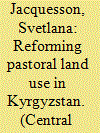

|
|
|
|
|
| Publication |
2010.
|
| Summary/Abstract |
The question of pastoral land use in colonial Central Asia is set against the goals and assumptions of present-day laws and regulations in Kyrgyzstan. In order to highlight the main choices of the colonial administration and their consequences on the local level the analysis is focused on three dyads: territorial divisions versus clan divisions, ownership versus administration and administration versus self-government. By pointing out that the colonial reforms on nomads were mainly driven by the phantoms of 'clans' and 'custom', this article argues that certain misconceptions of nomadism are characteristic of any modernization programmes, be they those of colonial Russia or those that are currently being implemented. In Kyrgyzstan the recently introduced 'grazing committees' as the main actors in the management and control of pastures perpetuate the myths of self-government and tradition among nomads. In conclusion the article advances the thesis that the reliance on 'custom' and 'tradition' and the dismissal of real social relations of pastoral land use are among the most important reasons for the failure of pastoral land reforms in the past and in the present.
|
|
|
|
|
|
|
|
|
|
|
|
|
|
|
|
| 7 |
ID:
079486
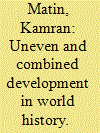

|
|
|
|
|
| Publication |
2007.
|
| Summary/Abstract |
IR's turn towards historical sociology is yet to overcome its ahistoricism. This lack of world-historical perspective, particularly conspicuous in relation to the non-European world, and arguably IR's emergence as a discipline, can be traced back to the theoretically fateful negligence of `the international' by the classical (historical) sociology on which the contemporary critiques of the mainstream IR theory tend to draw. This article develops this argument within the context of a theoretical reappraisal of the traditional approaches to the problematique of the premodern state in Iran and proposes an alternative theoretical framework that is critically drawn on Trotsky's theory of uneven and combined development as an internationally augmented historical materialism. Thus it argues that central to the premodern state-formation in Iran were the nomadic geopolitical pressure upon, and rule over, the agrarian Iranian society which gave rise to a synergetic nomadic-sedentary relationship mediated by, and crystallized in, the military-administrative institution of uymaq. This underlay the continuous formation, disintegration and re-production of successive states characterized by centralized patrimonial arbitrary rule.
|
|
|
|
|
|
|
|
|
|
|
|
|
|
|
|
|
|
|
|
|